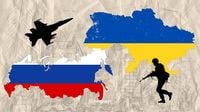On May 10, 2025, leaders from France, Germany, Poland, and the United Kingdom gathered in Kyiv, Ukraine, to express their unified support for the war-torn nation and to discuss a proposed 30-day ceasefire in the ongoing conflict with Russia. This historic meeting marked the first time that leaders from these four European countries visited Ukraine together, showcasing a strong commitment to finding a resolution to the crisis.
French President Emmanuel Macron, German Chancellor Friedrich Merz, British Prime Minister Keir Starmer, and Polish President Donald Tusk arrived in Kyiv with a clear agenda: to engage with Ukrainian President Volodymyr Zelenskyy and to advocate for a cessation of hostilities that would allow for meaningful peace negotiations. The leaders emphasized the need for Russia to accept the ceasefire proposal, which has been echoed by international leaders, including former U.S. President Donald Trump.
As tensions remain high in the region, the significance of this meeting cannot be overstated. It comes on the heels of Russian President Vladimir Putin's recent military parade on May 9, where he welcomed various world leaders, further complicating the diplomatic landscape.
During their discussions, the leaders reiterated their call for Russia to agree to a ceasefire without conditions for a period of 30 days. This suspension is seen as crucial for opening pathways to sustainable and fair peace talks. In a joint statement, they declared, "We and the United States call on Russia to accept all ceasefire agreements unconditionally for 30 days to create space for lasting and just peace negotiations."
President Zelenskyy welcomed the leaders warmly, taking time out of the discussions to honor Ukrainian soldiers who have lost their lives in the conflict. The somber visit to the memorial served as a poignant reminder of the stakes involved in the ongoing war.
However, the Kremlin's response to the proposed ceasefire has been less than enthusiastic. Dmitry Peskov, spokesperson for the Kremlin, stated that any ceasefire agreement must include stipulations that the United States and Western nations halt their military support to Ukraine during the ceasefire. Peskov argued that without such measures, the ceasefire would disproportionately benefit Ukraine, allowing it to regroup and reinforce its military positions.
Despite the challenges, the European leaders' meeting represents a critical step in international efforts to mediate the conflict. The leaders expressed their collective resolve to impose new sanctions on Russia should it reject the ceasefire proposal. The specifics of these sanctions have yet to be finalized, but the leaders are determined to hold Russia accountable for its actions.
The discussions in Kyiv are part of a broader strategy to reinforce Ukraine's position in the conflict and to ensure that Western support remains steadfast. The unity demonstrated by the four nations is a clear signal to Russia that the West remains committed to Ukraine's sovereignty and territorial integrity.
As the situation continues to evolve, the international community watches closely. The outcome of this meeting could have significant implications not only for Ukraine but also for the geopolitical landscape of Europe. Should Russia choose to engage in dialogue, it may pave the way for a much-needed de-escalation of hostilities.
In the wake of the leaders' visit, Zelenskyy has called for continued support from the international community, emphasizing the importance of solidarity in the face of aggression. He stated that the sacrifices made by Ukrainian soldiers must not be in vain and that the path to peace requires unwavering commitment from allies.
As the leaders departed Kyiv, they left with a renewed sense of purpose and a commitment to work together to ensure that the voices of the Ukrainian people are heard in the ongoing negotiations. The world is watching, and the hope for peace hangs in the balance as diplomatic efforts continue to unfold.
The meeting in Kyiv on May 10, 2025, is a testament to the power of unity in the face of adversity. The leaders' collective stance against aggression serves as a reminder that diplomacy, while challenging, remains a vital tool in resolving conflicts and fostering global stability.

